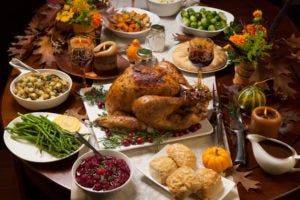It’s all good: What the experts say about gratitude, gobbling, giving and getting
We’ve been cautioned about the excesses of Thanksgiving: overeating, binge buying on Black Friday and Cyber Monday and the guilt that can follow. USC experts have a new and surprising take on these American traditions, from the low risk of overeating for one day to the retail impact of holiday mega-sales.
Contact: Emily Gersema, (213) 712-3168 or gersema@usc.edu; or USC Media Relations at (213) 740-2215 or uscnews@usc.edu
Giving thanks has health benefits
“Benefits associated with gratitude include better sleep, more exercise, reduced symptoms of physical pain, lower levels of inflammation, lower blood pressure and a host of other things we associate with better health. The limits to gratitude’s health benefits are really in how much you pay attention to feeling and practicing gratitude.”
Glenn Fox is a neuroscientist who oversees program design, strategy and outreach at the USC Performance Science Institute at the USC Marshall School. He is an expert in:
- The science of gratitude
- Peak performance
- Mindset and physiology
Contact: (213) 821-4691 or glennfox@marshall.usc.edu
Gratitude is an exercise in humility
“To be grateful is to express a personal relationship with that source, whether understood as an anthropomorphic deity or as the cosmos, the universe or the greater world. That’s a profound thing. To say ‘thank you’ to someone is to humble yourself, to recognize that you don’t have it all, you didn’t create it all. By humbling ourselves, we elevate our humanity.”
The Rev. Jim Burklo is the associate dean for the USC Office of Religious Life and an adjunct lecturer at the USC Price School and USC Suzanne Dvorak-Peck Schol of Social Work. In addition to gratitude, he also can discuss:
- Mindfulness
- Progressive Christianity
- Religion in politics
Contact: (213) 740-6110 or burklo@usc.edu
No need to fast before the feast
“Too many people skip breakfast and lunch in hopes of overindulging in dinner. This would work if we did not arrive at Grandma’s to tables of snacks prior to the Thanksgiving meal. The same rules apply: We should not shop when hungry, and we should not go to Grandma’s when hungry. If appetizers are served and dinner is several hours later, we may eat as many calories in appetizers as the Thanksgiving meal. Skipping meals most always leads to overeating.”
Carin Kreutzer is an expert and an associate clinical professor and coordinated program director at the USC Leonard Davis School of Gerontology and the Keck School of Medicine of USC. She can also discuss:
Why overeating on one day a year is not harmful How our bodies’ hormones help regulate our hunger and eating
Contact: (213) 740-9205 or kreutzer@usc.edu
A late Thanksgiving = (potentially) fewer gifts
“Where the shorter post-Thanksgiving shopping period does come into play is in the number of gifts that are bought and the value of gifts selected. A longer buying period may allow the shopper to buy multiple gifts to certain recipients, adding on smaller gifts uniquely suited for a particular recipient when these are encountered. It is also possible with less time available, some shoppers will pass up higher end gifts where more thought and research may be needed to make sure that a good deal is made, opting instead for lower priced, simpler items where the stakes are lower.”
Lars Perner is an assistant professor of clinical marketing at the USC Marshall School of Business. In addition to Black Friday, Perner can discuss:
Cyber Monday Consumer psychology Marketing
Contact: (213) 304 1726 or perner@marshall.usc.edu
###
[Thanksgiving Day feast photo by Shutterstock]

